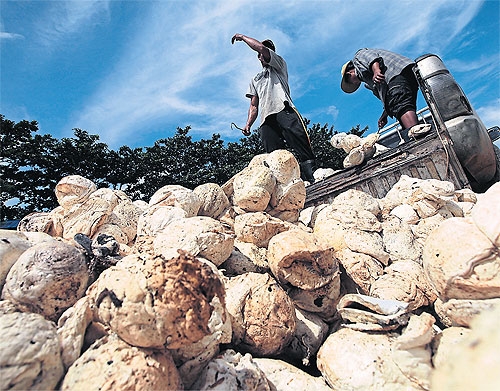Rural jobs creation 'boost economy'
- 3 กุมภาพันธ์ 2558 เวลา 06:00 น.
- รายงานข่าวโดย: Pathom Sangwongwanich | 4,667 viewed
The government should implement stimulus measures to boost the lacklustre economic recovery through job creation in rural areas by repairing small-scale infrastructure, says the Thailand Development Research Institute (TDRI).

Workers offload scrap rubber at a processing plant in the southern province of Surat Thani. With rubber prices declining, growers are opting to sell scrap rubber instead of making sheets as a way of cutting production costs. PATIPAT JANTHONG
Somchai Jitsuchon, research director for inclusive development, said repairs of infrastructure such as weirs and water reservoirs could create jobs in the countryside.
Countercyclical policies are aimed at revitalising growth when the economy is in a downturn while cooling down growth when the economy is heading up.
Economic stimulus could also be targeted at people working in the agricultural sector, as rural economies remain stagnant with low prices of farm products, Mr Somchai said.
"This would cause financial capital to circulate in the economic system and lead to long-term benefits such as improvements in farm production and irrigation," he said.
Mr Somchai said cash giveaways were an option to stimulate the economy but should be implemented only in times of severe recession.
Finance Minister Sommai Phasee recently said the government's 100-billion-baht scheme to help low-income earners would focus on job creation related to state spending on public utilities and the unemployed in non-farm sectors.
They would be aimed at boosting consumer purchasing power, but cash handouts would inevitably be included to help farmers' ailing economic conditions, he said.
Domestic politics remains an important factor influencing the government's fiscal policy stance, as the incumbent administration has adopted pro-cyclical measures amid the economic slowdown to differentiate itself from the previous government's hefty budget deficit when economic conditions were not dismal, Mr Somchai said.
He said Thailand's economy could expand by 4% this year, given improved export growth and accelerated public investment on infrastructure development, which would subsequently draw in private investment incentives.
Domestic consumption is difficult to rely on for stimulating economic growth due to household debt and falling agricultural prices contributing to higher debt-servicing ability for rural consumers, Mr Somchai said.
Ayhan Kose, the World Bank's director of development prospects, said emerging market economies had fiscal, monetary and structural policies to improve growth potential, but structural policies were considered to have medium-term importance to enhance growth and competitiveness amid weak global demand.
Having a reasonable fiscal space including lower deficits and debts as well as prudential financial stability is vital in mitigating economic headwinds, as this would translate into higher growth potential.


